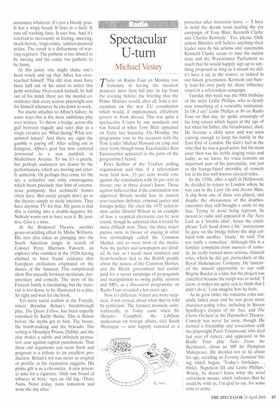The last taboo
Lloyd Evans
The Goat Apollo AmaZonla Bridewell The Quare Fellow Tricycle
Edward Albee's new play has a good,
strong, taboo-busting storyline. Architect, goat, love affair. Architect discovered. Family appalled. Indignant son seeks reconciliation. Outraged wife enacts revenge. For the audience, everything depends on the animal. Is the love affair genuine? Is it credible? Do you get the goat? And although Albee pours his considerable dramatic resources into convincing us that a rich, urban professional would suddenly become erotically attracted to and psychologically involved with a farmyard animal, I didn't buy it. Not for one second.
Having lumbered himself with a thighslapping storyline, Albee sets about lashing it into laughter. 'Come on, Dad, you're screwing a goat,' is his one and only crack of the whip. Pretty soon you're wilting under the repeated blows. Albee can do tragedy. Comedy is beyond him. So is farce. His central interest is in people, in domestic anguish and in the cadences of relationships in ruin. But even as a piece of drama the play can't find a way round its own improbability. When we peer into the architect's marriage, we find there's nothing wrong at all. Both partners adore each other. They're lovers; they're best mates; neither has ever had an affair before. So why, out of the blue, this sickening and destructive act of betrayal? No reason given. Well then, could the bleating one be a symbol for something else, for the madness of the architect or for society's reluctance to accept non-conformist sexuality? No.
Albee wants his farce to work as pure social realism. He focuses exclusively on the emotional ramifications of the affair. And that's it. The goat has no allegorical resonance whatever. It's just a bloody goat. It has a wispy beard. It lives in a field. It eats off washing lines. It says baa. And it's referred to incessantly in leering, sneering, mock-heroic, tragi-comic, satirico-pastoral asides. The result is a disharmony of warring registers. The pathetic is too absurd to be moving and the comic too pathetic to be funny.
At this point, one might shake one's head wisely and say that Albee has overreached himself. The old man must have been half out of his mind to select this potty storyline. Over-reach himself, be half out of his mind, these are the mental coordinates that every serious playwright sets for himself whenever he sits down to work.
No shame attaches to Albee's failure. In some ways this is the most ambitious play ever written. To throw a bridge across the gulf between tragedy and satyr play in a single creative act. What daring! What sensational lunacy! And there are signs the gamble is paying off. After selling out in Islington, Albee's goat has now cantered downwind to a new paddock in Shaftesbury Avenue. To me it's a puzzle, but perhaps audiences are drawn by the performances, which are moving and utterly authentic. Or perhaps they come for the set, a seductive and witty extravaganza which bears precisely that hint of ostentatious pomposity that architects' homes often have. But surely people don't go to the theatre simply to study interiors. They have daytime TV for that. My guess is that this is turning into a double-negative hit. Nobody wants not to have seen it. Be positive. Give it a miss.
At the Bridewell Theatre, another genre-straddling effort by Misha Williams. His new play takes us plunging into the South American jungle in search of Colonel Percy Harrison Fawcett, an explorer who vanished in the 1920s having claimed to have found evidence that European civilisation originated on the shores of the Amazon. This complicated show flits uneasily between mysticism, documentary and comedy. The story of the Fawcett family is fascinating, but the material is too dense to be illustrated in a play. Sit tight and wait for the book.
Yet more social realism at the Tricycle, where Brendan Behan's breakthrough
play, The Quare Fellow, has been expertly
reworked by Kathy Burke. This is Behan before the myths got to him. The booze, the bomb-making and the bravado. The setting is Mountjoy Prison, Dublin, and the play makes a subtle and infinitely persua sive case against capital punishment. That these old arguments can seem fresh and poignant is a tribute to an excellent pro duction. Behan's wit was never as original or prolific as his reputation suggests. His prime gift is as a chronicler. A new prisoner asks for a cigarette. 'Only one brand of tobacco in here,' says an old lag. 'Three Nuns. None today, none tomorrow and none the day after.'



















































































 Previous page
Previous page